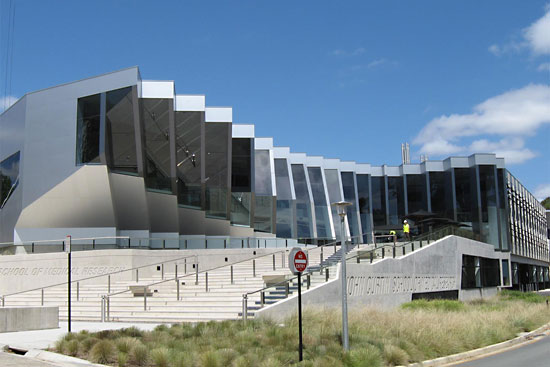ANU: A bigger way of knowing
A group of law students from The Australian National University (ANU) left their textbooks and study notes behind to take part in an Aboriginal-led experience focusing on the importance of deep listening.
Sixteen up-and-coming legal professionals visited the Northern Territory in April for a five-day, on-Country intensive piloted by ANU in collaboration with the North Australian Aboriginal Justice Agency (NAAJA). During their visit to Mparntwe (Alice Springs) and Uluru, the class met with Traditional Owners and Elders, as well as Aboriginal lawyers, educators and interpreters.
Dr Anthony Hopkins, from the ANU College of Law, taught the course alongside Professor Asmi Wood. Hopkins says that while deep listening as a concept is difficult to define, the immersive subject embodies a different approach to learning.
“We’re often taught a particular way to be open to the world – it’s caught up in the mind and the written word,” he says. “But there’s a much bigger way of knowing, which can include being aware of emotions within the body, being alive to the unspoken aspects of communications, or even engaging with the environment.”
After being launched at the National Indigenous Legal Conference in 2019, the course was set to run the following year, but had to be rescheduled twice due to COVID-related travel restrictions. For student Lilli Ireland, the opportunity to take part was one she didn’t want to miss.
“As an Aboriginal student, I have always been drawn to courses which analyse the colonial legal system and incorporate the voices of Indigenous peoples,” she says. “This course was beyond that – rather than just incorporating these perspectives, it was led by them.”
In preparing for the trip, NAAJA leads Kristy Bloomfield, Tanya Turner and John Rawnsley wanted the group to avoid extensive reading, so that they could arrive without expectations. One pre-requisite, however, was practising mindfulness.
“We had to try to strip our minds of all preconceptions to be open to a different worldview of law,” says Ireland. “Instead of preparing to have the answers, we were preparing to listen.”
The course was designed both to foster Indigenous leadership and educate allies. Student Aaron Bronitt says having the time to get to know his classmates in the pre-departure seminars made the trip especially rewarding.
“Having an awareness of people’s stories and their connections to Country made the whole experience even more powerful.”
The sense that they were experiencing something special was shared by the entire group. On their first night in Tempe Downs, the students were invited to take part in inma, a Pitjantjatjara term that can be roughly translated to mean stories shared through song and dance. The ceremonial performance took place as the sun was setting.
“I’ve worked out there for years as an Aboriginal Legal Aid lawyer and had not been invited to in engage in that way before,” says Hopkins. “Those sort of moments were priceless and consciousness shifting.”
Student Sophia Muray-Walker was in awe of how welcomed the group was by the Traditional Owners, Indigenous Elders and Aboriginal allies they met.
“I was very conscious of the fact that we were a group of predominantly white ANU Law students and the reality is that many of us – including myself – are very privileged beneficiaries of a colonial system,” she says. “We were so genuinely welcomed and met with such warmth, patience, kindness and an invitation to learn and focus on a shared future.”
Spending time on Country meant the group had to confront some of the deeply painful and traumatic effects of colonialism. The leaders from ANU and NAAJA made it a priority to ensure the students felt cared for.
“It was always going to be emotionally challenging,” says Hopkins. “As long as they felt those emotions were somehow being held in safe space, that was what mattered. A lot of the students told me that they’d never experienced the level of peace they felt in those days when were out of phone contact and sleeping with swags under the stars.”
The experience gave the students a deeper understanding of the way the Australian legal system can and should change to better serve and care for Indigenous communities.
“If there was ever a legal system that could be responsive to the needs of Aboriginal and Torres Strait Islander peoples, it would be our legal system, which is always changing and inherently adaptive,” says Bronitt. “We need to rethink how it can accommodate space for their laws, customs and cultural norms to thrive.”
This solution, says Murray-Walker, requires listening to and amplifying the work of First Nations advocates who already have the answers.
“It’s time for all non-Indigenous folk working and living within the Australian legal system to sit down, listen and educate themselves,” she says.
The course might be over now, but the students all agree that deep listening is an ongoing practice they will carry with them into their careers.
“Lawyers are taught the skills of expressing yourself in the most clear, concise, efficient matter,” says Bronitt. “But the most important thing you can do as a lawyer is to be a good listener and understand the needs of your clients.”

